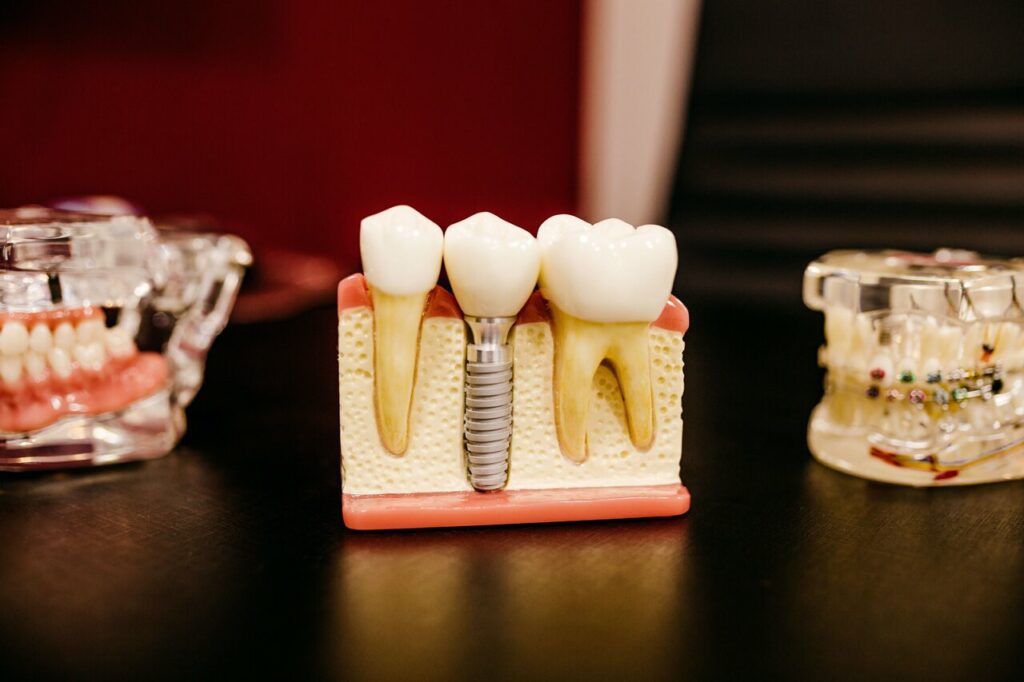Dental implants and dentures are popular tooth replacement options, but which one is right for you? In this blog post, we’ll look at each option’s pros and cons so that you can make an informed decision. Remember that your final decision should be based on your unique needs and preferences. So, let’s get started!
What Are Dentures
Dentures are a type of dental prosthetic used to replace missing teeth. They come in two main types: complete dentures, which replace all teeth in the upper or lower jaw, and partial dentures, which replace one or more missing teeth.
They are generally made from a plastic base fitted over the gums, with artificial teeth attached to the base. They are usually removable but can also be fixed using dental implants.
Dentures can improve the teeth’ function and appearance and help boost self-confidence. However, they require regular maintenance and care and can sometimes cause discomfort or irritation.
What Are The Pros And Cons Of Dentures?

Pros
- If you have trouble chewing because of missing teeth, dentures can help make eating easier.
- Dentures can help you speak more clearly. If your teeth are causing you to mumble or slur your words, dentures can help you speak more clearly.
- If you’re worried about looking older because of your missing teeth, dentures can help restore a more youthful look.
- Dentures can be removable, so you don’t have to worry about them while sleeping or eating.
- Dentures are relatively inexpensive, so they’re a good option for people on a budget.
- Dentures are easy to care for, so you don’t have to clean them much.
- Dentures can be made to match your natural teeth so they look more realistic.
- You can get custom-made dentures to fit your mouth, making them more comfortable to wear.
- Dentures can last for many years if correctly cared for.
Cons
- Dentures may not be as comfortable as natural teeth and can cause issues like soreness, gum irritation, and increased saliva production.
- Dentures also need to be regularly cleaned and maintained to prevent infection.
- Additionally, dentures can be expensive, and you may need to replace them every few years.
- It may be necessary to replace or adjust your teeth as your face and gums evolve with age.
What Are Dental Implants?
Dental implants are an increasingly popular way to replace missing or damaged teeth. Unlike dentures or bridges, which rest on top of the gums, dental implants are surgically inserted into the jawbone.
Once in place, they provide a sturdy foundation for artificial teeth. Because dental implants fuse to the jawbone, they provide a level of stability and comfort that is not possible with other types of dental prosthetics. In addition, dental implants can last for many years with proper care.
For these reasons, dental implants are often considered the gold standard for tooth replacement. If you are considering dental implants, be sure to consult with a qualified dentist to see if they are right for you.
What Are The Pros And Cons Of Dental Implants?
There are many benefits to dental implants, including:
- Dental implants look and function just like natural teeth.
- They are permanent, so you don’t have to worry about them slipping or falling out.
- Dental implants are easy to care for, and you can brush and floss them just like your natural teeth.
- Dental implants are strong and durable so that you can eat all your favorite foods without worry.
- Do not require extra care beyond brushing and flossing.
- These implants can last a lifetime with proper care.

Cons Of The Dental Implants
Dental implants are not without their drawbacks.
- One of the biggest concerns is that they can be expensive, and insurance may not cover the cost.
- Additionally, the surgery required to place them can be complex, and there is a risk of complications.
- Finally, they require diligent oral hygiene to maintain and may not be suitable for people with certain medical conditions.
If you are considering dental implants, be sure to consult with a qualified dental professional to see if they are right for you.
What To Consider When Choosing Dental Implants vs. Dentures
When choosing the right dental solution for you, remember some vital things. Here are a few factors to consider when choosing between dental implants and dentures:
Your Budget
Dental implants can be a more expensive option up front, but they may be a better long-term investment. Dentures, on the other hand, are typically more affordable. Dental insurance may cover some of the costs associated with dental implants, but it is essential to check with your insurer.
Your Lifestyle
Dental implants might be the better option for you if you lead an active lifestyle. They’re more secure and can help you feel more confident when participating in activities like eating or talking.
Your Oral Health
Your overall oral health is also an important consideration. Dental implants may be the best option for you if you have good oral health and healthy gums. However, dentures may be a better choice if you have gum disease or other dental problems.
Your Timeline
Dental implants require a surgical procedure and can take several months to heal. Dentures might be a better option if you need a more immediate solution.
Your Preferences
Ultimately, the decision between dental implants and dentures comes down to your personal preferences. Consider all of the factors above to make the best decision for you.
Cost Of Dentures And Dental Implants
When considering dental implants, it’s essential to understand the costs involved. Dental implants are not typically covered by dental insurance, so you’ll need to pay for them out of pocket.
The American Dental Association estimates that the average cost of a single dental implant is $3,000. However, this figure can vary depending on the dental office and the location of the implant.
In some cases, dental implants may be covered by dental insurance if they are considered medically necessary. However, this is typically only the case if the patient has a severe dental condition that cannot be treated with traditional dental methods.
On the other hand, The American Dental Association (ADA) estimates that the average cost of a complete set of dentures is around $1,500. This can be a significant expense for many people, especially those on a fixed income.
There are a few ways to help offset the cost of dentures. Some dental insurance plans do cover at least a portion of the expense. The ADA also offers a dental savings plan through its website that can help reduce the cost of dental care, including dentures.
Conclusion
Dental implants and dentures have pros and cons, so it’s essential to weigh all the factors involved to make the best decision for your situation. If you’re considering dental implants or dentures, consult your dentist about which option is best for you.
